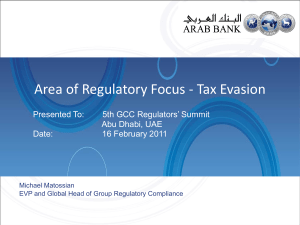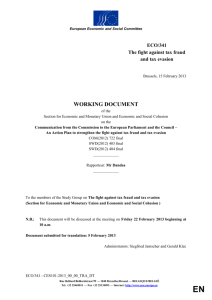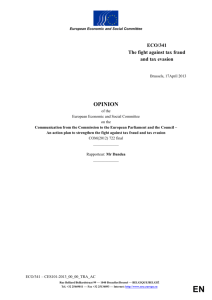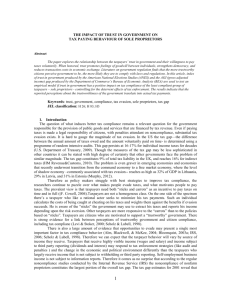EN EN COMMISSION STAFF WORKING DOCUMENT EXECUTIVE
advertisement
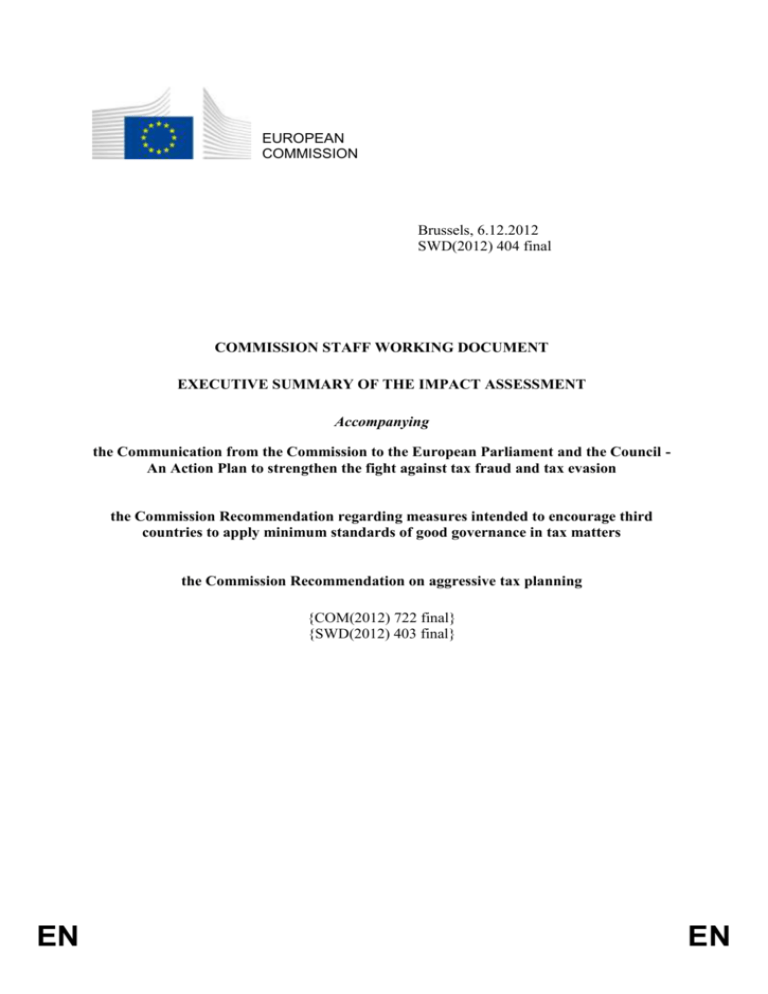
EUROPEAN
COMMISSION
Brussels, 6.12.2012
SWD(2012) 404 final
COMMISSION STAFF WORKING DOCUMENT
EXECUTIVE SUMMARY OF THE IMPACT ASSESSMENT
Accompanying
the Communication from the Commission to the European Parliament and the Council An Action Plan to strengthen the fight against tax fraud and tax evasion
the Commission Recommendation regarding measures intended to encourage third
countries to apply minimum standards of good governance in tax matters
the Commission Recommendation on aggressive tax planning
{COM(2012) 722 final}
{SWD(2012) 403 final}
EN
EN
COMMISSION STAFF WORKING DOCUMENT
EXECUTIVE SUMMARY OF THE IMPACT ASSESSMENT
Accompanying
the Communication from the Commission to the European Parliament and the Council An Action Plan to strengthen the fight against tax fraud and tax evasion
the Commission Recommendation regarding measures intended to encourage third
countries to apply minimum standards of good governance in tax matters
the Commission Recommendation on aggressive tax planning
EN
2
EN
TABLE OF CONTENTS
EN
1.
Introduction .................................................................................................................. 4
2.
Procedural issues and consultations of interested parties ............................................ 4
3.
Problem definition........................................................................................................ 5
4.
Objectives ..................................................................................................................... 8
5.
Policy options ............................................................................................................... 8
6.
Analysis of impacts of the policy options .................................................................... 9
7.
Comparison of main options ...................................................................................... 10
8.
The preferred options ................................................................................................. 10
9.
Monitoring and evaluation ......................................................................................... 10
3
EN
1.
INTRODUCTION
The common purpose of national tax systems of EU Member States (MS) is to be
effective and fair, i.e. to raise sufficient revenues in a fair manner in accordance with
the democratic choices of each State. However, these objectives are threatened by a
combination of tax fraud, evasion and aggressive tax planning often involving tax
havens.
The amount of lost tax is difficult to estimate, but according to a study concerning
the USA the revenue cost of profit shifting towards "tax havens" by US
multinationals could be up to $60 billion, while individual tax evasion could cost up
to $50 billion yearly1. Estimates are not available for the EU, but on the basis of the
similar amount of FDI stocks in "tax havens" in both USA and the EU the tax
revenue losses can be estimated to be of similar magnitude.
The Impact Assessment analyses in a manner commensurate with each of the
problems at stake the actions that could be considered to address those problems. The
intention is to assist the Commission in selecting and deciding on the best policy
options.
Terms used in this document can be found in a comprehensive glossary in annex
14 to the impact assessment report (see COM(2012)3512 unless otherwise stated)
Tax fraud is a form of deliberate evasion of tax which is generally punishable under
criminal law.
Tax evasion generally comprises illegal arrangements where liability to tax is hidden
or ignored, i.e. the taxpayer pays less tax than he is legally obligated to pay by hiding
income or information from the tax authorities.
Tax havens, also sometimes referred to as 'non-cooperative jurisdictions' (NCJ)
are commonly understood to be jurisdictions which are able to finance their public
services with no or nominal income taxes and offer themselves as places to be used
by non-residents to escape taxation in their country of residence. Tax avoidance is a
term difficult to define but which is generally used to describe the arrangement of a
taxpayer's affairs that is intended to reduce his tax liability and that although the
arrangement could be strictly legal is usually in contradiction with the intent of the
law it purports to follow. (OECD Glossary Tax Terms)
2.
PROCEDURAL ISSUES AND CONSULTATIONS OF INTERESTED PARTIES
The Impact Assessment was reviewed by the Impact Assessment Board. An
extensive programme of consultation and research was carried out during 2012. This
included a formal public consultation on Double Non-Taxation and an extensive data
collection and analysis exercise by PWC on defensive tax measures in a sample of
1
2
EN
J; G. Gravelle (2009): Tax Havens: Tax Avoidance and Evasion. CSR Report for congress.
COM(2012) 351 final
4
EN
MS in relation to tax havens and aggressive tax planning. Only limited quantified
data was available. For example the quantified benefits of some specific measures in
Denmark, France Germany and the Netherlands ranged from 13 million euro to
1,500 million euro per year. In summary some MS are able to raise tax revenues by
taking specific protective measures, although the precise types of measures differ.
Fiscalis Seminars on the issues were held with MS administrations and business,
Non Governmental Organisations (NGO) and academic stakeholders. The main
conclusions were general support for a) measures to enhance existing instruments of
cooperation and the development of automatic exchange of information, and b) an
EU coordinated approach including clear definitions of key concepts although some
MS would prefer national measures and some attendees stressed the importance of
not increasing administrative burdens nor effecting competition. No further
quantitative data was received.
The Taxation Policy Group and Council High-Level Working Party have also
discussed recently evasion and fraud and there is general agreement that enhancing
action against this is a key priority. Measures must be proportionate and not lead to
increased cost for taxpayers.
3.
POLICY CONTEXT, PROBLEM DEFINITION, AND SUBSIDIARITY
Tax evasion and avoidance have developed internationally with the globalisation of
the economy. The current economic crisis and budgetary constraints require that any
losses of tax revenue are prevented, that tax systems are as efficient as possible, and
to close opportunities for abuses, so as to secure sustainable tax revenues and support
high levels of compliance based on fair and fairly applied tax systems.
3.1.
Problem definition
Tax fraud and evasion limit the capacity of Member States to carry out their policies,
and raise issues of fairness between compliant and incompliant taxpayers.
Three problems need to be addressed within the EU:
–
Insufficient tax collection within Member States, linked to low tax compliance
and poor administrative capacity;
–
Lack of effectiveness in cross-border administrative cooperation, which is
limited by difficulties in identifying taxpayers in automatic exchange of
information, and in agreeing in Council on closing loopholes from the Savings
directive;
–
Quality of tax legislation and its fitness for purpose because of insufficient use
of existing legal instruments.
In an international context, the effectiveness of Member States’ tax systems are
undermined in three ways:
- because of their own unintended loopholes, and of mismatches occurring with other
countries’ tax systems leading to double non-taxation in cross-border situations. In
EN
5
EN
the EU Internal Market, double non-taxation gives a competitive advantage to some
taxpayers, and may be detrimental for those Member States which see their tax bases
eroded. It can be addressed by changes in national legislation and double tax
conventions;
- because of taxpayers exploiting these loopholes and mismatches (aggressive tax
planning).Tax planning increasingly involves ever-more sophisticated structures
which develop across various jurisdictions and effectively, shift taxable profits
towards states with beneficial tax regimes. The cross-border dimension of many
structures and the increased mobility of capital and persons in the Internal Market
makes it difficult for MS to address this alone;
- by other jurisdictions actively or passively facilitating the erosion of other
countries’s tax bases. This scenario can involve aggressive tax planning schemes,
specific tax regimes providing a low level of taxation to non-residents, or a very low
general level of taxation together with a reluctance to cooperate with other countries’
tax administrations. Tax havens offer the possibility for taxpayers of other countries
to relocate their tax bases in their low-tax jurisdictions, and to conceal this from their
country of residence (through means such as obstacles to the identification of
beneficial ownership and bank secrecy).
Although the precise dimensions of the revenue losses incurred are unknown they are
generally accepted to be in the billions of Euro. Individual countries do sometimes
estimate losses in revenue and academics have used a range of different methods to
quantify them. These sometimes mix evasion and avoidance, combine direct and
indirect taxes, include non-EU country data and use proxies such as the size of the
'shadow economy' to estimate tax losses. In addition some of the terms – evasion,
avoidance and tax-havens for example are used in different ways. However, one
example illustrates that there is a problem that needs resolving as quickly as possible.
The UK alone recently estimated tax avoidance reduced revenues by several billion
pounds3 annually.
The international dimension of this phenomenon makes it difficult for MS to protect
their tax systems, since national anti-abuse measures can easily be circumvented by
using complex tax structures and tax havens, or routing through another MS with a
lower level of protection.
Despite several efforts at national level to try to influence third countries to apply
minimum standards of good governance in tax matters (i.e. transparency, exchange
of information and fair tax competition), a number of third countries remain reluctant
to cooperate. Current leverage is therefore of limited efficiency.
3.2.
Who is affected
EU MS are affected because of the budgetary impact and the need to adopt corrective
measures (of administrative, regulatory or external policy nature).
Taxpayers are affected since the policies in the area concerned are important for
guaranteeing fairness between them. They are also affected by corrective measures
3
EN
Lifting the Lid on Tax Avoidance Schemes – July 2012 – http://www.hmrc.gov.uk/
6
EN
from Member States. For example the latest guidance notes for applying a single
piece of UK anti-avoidance legislation run to 115 pages. If all MS followed, a group
of companies could be faced with considerable additional complexity. Moreover, the
PWC study of fourteen MS found 165 different anti-abuse measures.
However there is no indication that Small and Medium Sized Enterprises (SME)
would be more seriously affected than large enterprises, since activity with a crossborder dimension is more likely to involve the latter category. Citizens, as welfarestate beneficiaries, are indirectly affected by the shrinking budget for public services
and social benefits.
Third countries are also affected, either as tax havens unduly attracting MS revenues,
or as partner countries which flows may be affected by MS’ anti-abuse rules. Where
measures are targeted at specific countries (black or grey lists) there is little or no
overall consistency amongst the EU MS.
3.3.
Likely evolution of the problem (baseline scenario)
If no action is taken then MS will continue to have problems raising revenue and
may have to raise taxes to secure their revenues.
In relation to fraud and evasion the three specific problems where action has been
identified as decisive and urgent will remain.
No progress will materialise either in regard to third countries not complying with
minimum standards of good governance in tax matters, in particular tax havens, as
well as in regard to aggressive tax planning. It is likely that EU MS will react
individually, within the limited effectiveness of such measures. In addition, there is
little indication currently that MS would launch spontaneously initiatives at bilateral
or multilateral levels to overcome jointly the problems. Other international initiatives
(OECD) are unlikely to address the specific EU concerns.
3.4.
Subsidiarity
MS encounter difficulties in protecting alone their tax systems efficiently because
scattered national countermeasures are of limited effectiveness when it comes to
cover the complexity of tax international avoidance schemes. Moreover, Member
States could be lead to invidually reinforce such measures in a manner that would
undermine regular business investment and create additional tax obstacles.
Thus, these national actions (or lack of action) have a direct impact on the
functioning of the internal market as it can distort competition among EU businesses,
and on the ability of Member States to meet the commitments of the Stability and
Growth Pact4.
Therefore, action at Union level is better fitted to achieve the objectives.
4
EN
http://ec.europa.eu/economy_finance/economic_governance/sgp/index_en.htm
7
EN
4.
OBJECTIVES
The general objective is to come, through a Union approach commensurate with the
need to ensure the functioning of the internal market, to a better protection of MS tax
systems against abuses and loopholes and, in particular, agains cross-border
international tax fraud and avoidance. Such practices are detrimental to MS tax
revenues.
This general objective translates into the following specific objectives:
In regard to cross-border fraud and evasion in direct and indirect taxation:
(Objective 1) Enhance tax co-operation, tax administration, tax
enforcement and tax collection for cross-border operations between MS
tax authorities
In regard to jurisdictions not complying with minimum standards of good
governance, in particular tax havens, and to aggressive tax planning:
(Objective 2) Closing loopholes and potential for abuse of MS direct tax
systems (national legislation and DTCs) – this would contribute to
addressing the issues of double non-taxation and aggressive tax planning
(Objective 3) Improving the efficiency of measures taken at national
level to counter international tax avoidance – this would contribute to
addressing the issue of aggressive tax planning
(Objective 4) Improving in an EU context the leverage that MS have
towards third countries in tax matters – this would address the issue of
jurisdictions not complying with minimum standards of good
governance.
The operational objective is to secure and increase revenues for MS. Given the
differences of MS tax systems and economic structures, the monitoring of this
objective will need to be considered with each MS individually.
These objectives are consistent with other policies. They build on the existing policy
of good governance in the tax area, and on the request from the European Council in
March 2012 to enhance the fight against tax fraud and evasion. In a wider context
they are consistent with efforts made against money-laundering and terrorist
financing both at the EU level and by the financial action task force (FATF), and
with the Annual Growth Survey 2012 and its recommendations to Member States to
braoden tax bases and improve tax collection.
5.
POLICY OPTIONS
The following table summarises the policy options identified to achieve the
objectives.
EN
8
EN
Baseline scenario
No EU change
(Objective 1) Enhance tax co-operation, tax administration, tax enforcement and tax collection for cross-border
operations between MS tax authorities
- Option A1:
Presenting an action plan including prioritising specific measures
(Objective 2) To close loopholes and potential for abuse of MS direct tax systems (national legilsation and double tax
conventions)
- Option B1:
- Option B2:
Address loopholes in national legislation through discussions in the Code of conduct Group for business
taxation. As the Code is of Conduct group is discussing these issues this option is considered to be in place
already
Recommendation to prevent double non-taxation in double tax conventions.
(Objective 3) To improve the efficiency of measures taken at national level to counter international tax avoidance
- Option C1:
Recommendation of EU compliant and effective general anti abuse rule (GAAR) as a standard
(Objective 4) To improve in an EU context the leverage that MS might have in convincing third countries to
implement good governance in tax matters
- Option D1:
- Option D2:
6.
Elaborate an EU definition of third countries not complying with minimum standards of good governance in
tax matters, on the basis of principles recognised in this area
Toolbox of measures to be applied according to whether or not the third countries concerned comply with the
mimimum standards defined.
ANALYSIS OF IMPACTS OF THE POLICY OPTIONS
The following table summarises the analysis of the impacts (ascending scale from --to +++).
Expected impact
Baseline
scenario
A1
B2
C1
D1
D2
Likely to
continue or
deteriorate
EN
Effectiveness in
achieving policy
objective
---
++
+++
++
+++
+++
Fundamental rights/
Four freedoms
--
-
+
+/++
+
=
Economic impact
---
++
++
+++
+++
+++
Social impact
--
+++
=
=
++
++
Impact on
taxpayers/tax
administrations
---
++/+++
++
+++
++
+++
Impact on EU budget
=
--
=
=
=
=
Impact on other
parties
=
=
=
=
-
-
9
EN
7.
COMPARISON OF MAIN OPTIONS
The following table summarises the comparative assessment of the options
(ascending scale from --- to +++).
Comparison of policy options
Baseline
scenario (no
EU action)
A1
B1
B2
C1
D1
D2
Not
assessed
Incentive for MS to
strengthen their rules
=
+++
n/a
n/a
n/a
n/a
Effectiveness
---
+++
+++
+++
++
+++
Proportionality
=
+++
+++
+++
+++
+++
Efficiency
=
+++
+++
+++
+++
++
Flexibility
=
+++
+++
+++
+++
+++
Preferred
option
Preferred
option
Preferred
option
Preferred
option
Preferred
option
Conclusion
8.
THE PREFERRED OPTIONS
In view of its effectiveness proportionality and flexibility, the preferred option for
meeting objective 1, i.e. enhance tax co-operation, tax administration, tax
enforcement and tax collection for cross-border operations between Member States
tax authorities, is the issuance of a prioritised action plan of measures. Choosing the
no-change option would carry high risks.
The preferred options for dealing with third countries not complying with minimum
standards of good governance in tax matters, as well as with aggressive tax planning,
flow from the tables above, as a combination of Policy Options B2, C1, D1, and D2.
This is a more detailed series of measures where rapid progress in the short term
could be achieved.
9.
MONITORING AND EVALUATION
In the absence of a reliable quantitative baseline for monitoring and evaluating
progress regular reports should be prepared by the Commission on the
implementation of the Action Plan and the above recommended actions.
EN
10
EN
